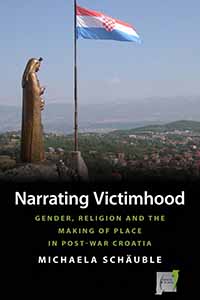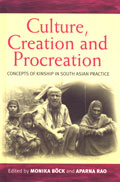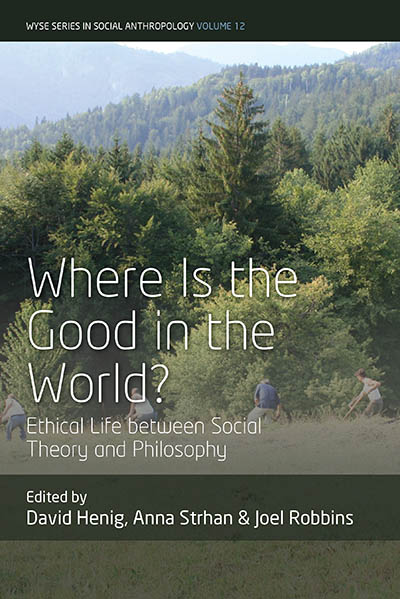
Series
Volume 11
Space and Place
See Related
Anthropology JournalsEmail Newsletters
Sign up for our email newsletters to get customized updates on new Berghahn publications.
Narrating Victimhood
Gender, Religion and the Making of Place in Post-War Croatia
Michaela Schäuble
392 pages, 28 illus., 1 map, bibliog., index
ISBN 978-1-78238-260-7 $150.00/£115.00 / Hb / Published (April 2014)
ISBN 978-1-78533-740-6 $39.95/£31.95 / Pb / Published (September 2017)
eISBN 978-1-78238-261-4 eBook
Reviews
“I highly recommend the book for courses and projects dealing with political transformation processes in southeastern Europe, but also more broadly with the anthropology of ethno-nationalism and identity as well as collective memory studies in contexts of war, violence, and trauma.” • Journal of the Royal Anthropological Institute
“We get a deep insight into rural Dalmatia and learn about its inhabitants’ stories from many different perspectives thanks to the author’s thick descriptions and detailed analyses…It is a story that enables us to ‘zoom out’ well beyond Croatia and reflect on people’s manifold ways of narrating and dignifying their lives and our own role as scholars in accounting on them.” • Sociologus
“The book opens with a vivid description of how Michaela Schäuble, the author, and Marko, one of her interlocutors, gazed at the scenery of the central Dalmatian hinterland, in Croatia, through a telescope. Subtly inviting the readers to join, the prose in this book makes it clear that Schäuble is both an anthropologist and a filmmaker. Reading her rich ethnographic descriptions of Dalmatia, a rural, impoverished, marginal region in Croatia, characterised by ‘a stony, infertile soil and heavily fragmented landholdings’, often feels like following a camera’s movement through a scene.” • Anthropological Notebooks
“This volume seduces primarily through its rich [and historically informed] ethnography. Other strong points of the book is not only a thorough examination of the anthropological literature and its neighboring fields, but the fact that the author’s interpretations and analyses contribute to a more nuanced, actualized, and critical approach to the existing works…Apart from offering stimulating reading and a quality contribution to Balkan Studies, this book can also, one hopes, inspire a fruitful dialogue between the latter and Mediterranean Studies.“ • Journal of the Swiss Anthropological Association
“This excellent book should inform and stimulate further research on the region, on masculinities, on state building, and on right-wing politics.” • Südosteuropa
“The narratives of victimhood expressed in forms that Michaela Schäuble’s sensitive ethnography traces through festivals, protests, and pilgrimages in the Sinj area combine claims about present-day and historical collective suffering into an overarching account of the systematic persecution of the narrator’s nation (in this case, the Croats).” • Slavic Review
“Schäuble delivers a well rounded account of the Dalmatian hinterland…[that] highlights Croatia’s multifaceted culture and its struggle to find a unified identity, an identity that is able to represent the country beyond its borders.” • Gender Forum
“…the book deserves to be widely read, because it is a fascinating account of the nationalist and highly regionalist stances found in post-war Croatia.” • Social Anthropology/Anthropologie sociale
“In the broader context of post-war Croatia, Schäuble shows in a remarkable way what key role the interpretation of the “Homeland War” of the 1990s plays in the identity building processes around those mass events.” • Nationalities Papers: The Journal of Nationalism and Ethnicity
“[This book] is scholarly, very well researched, and contains some fascinating original ethnographic material that is handled with imagination and sensitivity.” • Frances Pine, Goldsmiths, University of London
“This is a truly excellent study. From the first to the last page, I was impressed by its thoughtfulness, level of scholarship, and ethnographic thoroughness…She succeeds in making this unstudied place come alive in her ethnography while simultaneously making her rich ethnographic detail serve as a lever for a highly sophisticated analysis of a cluster of issues that are both of contemporary political relevance and of theoretical significance.” • Marko Zivkovic, University of Alberta
Description
Mythologies and narratives of victimization pervade contemporary Croatia, set against the backdrop of militarized notions of masculinity and the political mobilization of religion and nationhood. Based on extensive ethnographic fieldwork in rural Dalmatia in the Croatian-Bosnian border region, this book provides a unique account of the politics of ambiguous Europeanness from the perspective of those living at Europe’s margins. Examining phenomena such as Marian apparitions, a historic knights tournament, the symbolic re-signification of a massacre site, and the desolate social situation of Croatian war veterans, Narrating Victimhood traces the complex mechanisms of political radicalization in a post-war scenario. This book provides a new perspective for understanding the ongoing processes of transformation in Southeastern Europe and the Balkans.
Michaela Schäuble is Assistant Professor in Social Anthropology at the University of Berne (Switzerland). Previously she was a Lecturer in Social and Visual Anthropology at the University of Manchester and has held postdoctoral fellowships at the Mahindra Humanities Center at Harvard University and the Institute of Advanced Studies at Bologna University.




